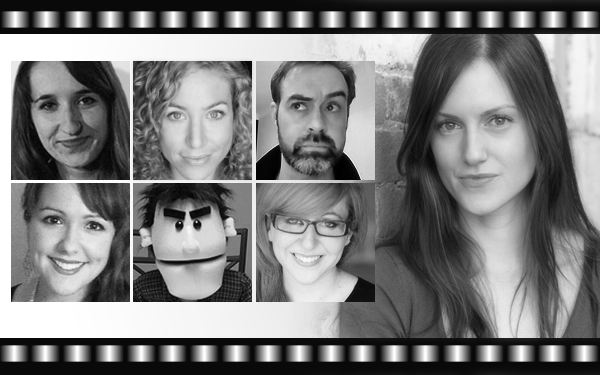By Brianne Hogan.

Olga Lexell
Growing up, script reader Olga Lexell was a bit of a nomad, living in a handful of different countries, but there was always one constant in her life: film.
“My mother exposed me to a lot of indie and foreign films when I was a kid,” Lexell recalls. “I used to go to the library when I was younger and check out published scripts, which is how I learned a lot about screenwriting.”
Lexell eventually settled in L.A. where she attended film school at USC, majoring in film history and screenwriting with a minor in business and psychology. It was during school where Lexell first experienced reading scripts when she worked as an intern for a number of big production companies in their respective development departments.
Although Lexell’s ultimate goal was to work as a screenwriter, like many students, she needed a flexible job to pay the bills. Based on her experience as an intern, she eventually landed a paying gig through her university’s job board that had an ad up for a freelance reader position at a major publisher. She was hired to read books on a weekly basis, and soon afterward, thanks to the connections she made while interning, she’s been hired to read scripts for film festivals, production companies and coverage services. Though Lexell has a full-time job in television, she does maintain a flourishing freelance career in script reading.
Creative Screenwriting Magazine wanted to know what are Lexell’s big “no nos” to avoid the slush pile, and what type of scripts would get the all-important green light.

USC School of Cinematic Arts, LA
What companies do you currently work for?
A major studio, a production company, and a coverage service, mostly. I also just got two offers to work for major festivals and competitions, which is exciting as I enjoyed my first experience with a festival a lot. Reader work is freelance, so a lot of times a company might give you ten scripts to read in a week and then you won’t hear from them for several months, so while I have a lot of employers, I only take on as much work as I know I can handle.
Do you have a particular genre of film that you’re most comfortable consulting for?
Not really. Readers need to be versatile. When you’re judging a script, you should be examining whether it’s a fit for the company you’re reading for, not necessarily whether it’s the greatest thing you’ve ever read. If there are genres you dislike, especially if the company you read for wants to produce more films from those genres, you are limiting them.
How many scripts do you read per week?
My reading load varies as I try to give myself time off occasionally. My regular job involves a lot of reading so I don’t want to burn myself out, as a lot of readers do when they take on too much. Typically, my busiest weeks will involve 1-2 scripts per day and a book or two over the weekend, which gets to be overwhelming on top of my full-time job. I try to keep it down to one book and 3-4 scripts per week so that I can save my reading for the weekends.

What’s your process like when you sit down to read a script?
I open one document to track the synopsis, which I write as I read, and another document for general notes. Some people wait until after they read the script to do all of that, but I think you forget a lot of things that way. I prefer reading digitally over paper copies.
Writers are grilled about the third-act structure, and how certain elements are “supposed” to happen at a particular time. (Catalyst on page 12, for example). Do you agree with that? Is there any wiggle room?
The eight sequence/three act structure you’re referring to isn’t necessarily a how-to guide as much as it is a reflection of what films have done in the past. I think the eight sequence structure works because that’s how audiences have been trained to consume a film. And it is based on the fact that reels used to be a certain length — that’s why a lot of times when you watch foreign films, the structures vary wildly compared to what we’re used to. The eight sequence structure is, by no means the only way to write a story. However, a story will always have a beginning, middle, and end, so with that said there are some important takeaways to keep in mind.
What are big “no nos” to avoid the slush pile?
If you pitch your script as “The Godfather meets Interstellar,” I’m probably not even going to bother reading it. Don’t try to compare your work to major films. If your script was that incredible and genre-bending you wouldn’t be submitting it to me. No one buys this. Ever. Similarly, avoid loglines like “George Washington travels through time to kill Hitler on the Titanic.” A lot of writers mistake randomness for originality — sure, I bet no one has ever written that screenplay, but what are the odds that it’s genuinely rooted in character? Similarly, avoid writing screenplays that talk down to your audience. I’ve read more than my fair share of scripts where characters will go on multi-page monologues about absurd philosophical concepts where it just sounds like the writer is trying to prove how smart they are. Being a good writer is distilling complex emotions into something an audience can consume. Some people will argue that writers should only write for themselves, but I disagree completely. I think a writer’s responsibility is to write for an audience (at least, if you want anyone to see your movie).

The Godfather Meets Interstellar
What excites you most about being a script reader?
Some of my jobs give me the ability to send notes directly to the writer which I enjoy a lot. If I can help at least one person become a better writer even in the smallest way then I feel like I’ve done something good.
Your personal blog (outofthesprawl.tumblr.com) is filled with your photography. How can writers, who are usually so ingrained with using words, use imagery to set their films (a visual medium) to set their scripts apart?
I went to film school with the initial goal of becoming a director of photography and I’ve been a photographer my entire life. I think it’s important for writers to understand how films are shot so that they know what is even possible to film. Sometimes I’ll see a writer use some crazy convoluted action description like “He dives across the coffee table as she ducks, and simultaneously, her shoelace wraps around a ceiling lamp and chokes him accidentally but she doesn’t notice — the audience doesn’t know that she is actually an evil twin and not the protagonist but more on that later — and there’s been a SWAT Team hiding under the table the entire time who arrest her dog off-screen earlier in the scene” and I just lose my mind because obviously there’s no way to film something like that. On the other side of the spectrum, writers will overload a script with tons of needless camera direction, which is equally frustrating. A lot of people don’t think of writing as a visual medium, but your writing should still be able to give people a clear and concise image in their mind, otherwise no one is going to be able to see it as a movie.

Kinkaku-Ji, Kyoto, Japan. Taken by Olga Lexell
What script will get the green light from you?
Something fresh and original that is rooted in character and not concept. One of my favorite spec scripts that I’ve ever read for work was Story of Your Life by Eric Heisserer, which was a Blacklist script that is currently being made into a film.
Screenplay contests. Are they a viable way to break into the industry?
There are a lot of legitimate contests out there sponsored by major foundations — Austin, Nicholl, Slamdance, and Sundance Labs, to name a few — but there are a lot of inconsequential ones too. I can think of a few writers whose material fell into my hands after they won one of the aforementioned, but a lot of writers enter these so it requires some degree of luck.
The aspiring screenwriter has read blogs, read screenplays, placed in competitions and is now ready to take on Hollywood. What’s the most important thing she still doesn’t know?
Your connections are more important than you think. No one sets out to make a bad movie, but when given the choice people are going to want to invest in a movie written by someone they trust even if it’s only 80% as good as something written by a person with no experience whatsoever.
What film(s) do you think has the most well-crafted screenplay?
I think Little Miss Sunshine is one of the greatest screenplays ever written. The Graduate and American Beauty were big favorites of mine as well growing up. Most recently, I loved the scripts for Her, Nightcrawler, Nebraska, and 12 Years a Slave, which all broke the rules in interesting ways.

Little Miss Sunshine
Lastly: what’s your biggest piece of advice for the aspiring screenwriter?
Do not reject notes. If someone gives you a note, listen to what they have to say, because they are taking significant time out of their day to give you the feedback that you requested and they wouldn’t be trying to help you if they didn’t have your best interest at heart. One time a writer called me illiterate for giving their script a pass — shockingly I don’t believe they’ve sold a script yet.

